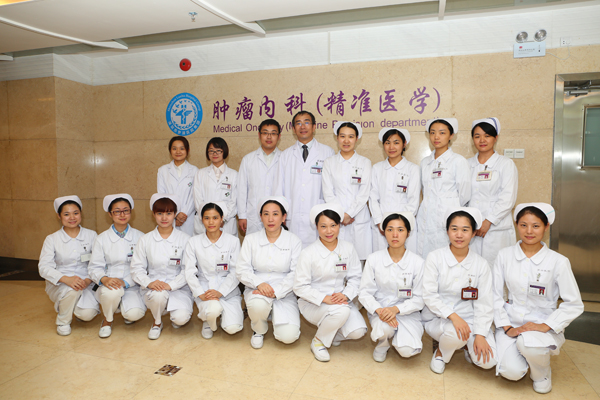Department Overview

The Medical Oncology ward is a key discipline developed by Luohu Hospital and excels in tumor diagnosis and treatment. The department is primarily engaged in the basic and clinical diagnosis and treatment of oncology. Staff members are proficient in the principles of diagnosing and treating common malignant tumors and develop comprehensive cancer treatment plans tailored to individual patients. The department also specializes in tumor immunotherapy and targeted drug testing, screening, and treatment, and has strong capabilities in preventing and managing tumor complications and emergencies.
The Department of Medical Oncology leverages the scientific research and advanced testing capabilities of the Luohu Hospital Inspection Center, Central Laboratory, and Shenzhen Zhongxun Precision Medicine Research Institute to conduct precise tumor gene testing, circulating tumor cell detection, and screening for chemotherapy drug sensitivity in malignant tumors. These technologies enhance the accuracy and targeting of clinical diagnosis and treatment.
Carry Out Projects
The Medical Oncology department boasts a medical and nursing team with advanced technical skills and first-class services for the comprehensive treatment and diagnosis of malignant tumors. The team formulates personalized treatment plans based on the patient's condition, physical status, and results of biological genetic testing. For complex cases, the department regularly organizes multidisciplinary case discussions (MDT), involving oncology experts from across the hospital to develop tailored treatment plans.
The department offers a range of treatment technologies, including neoadjuvant chemotherapy before tumor surgery, adjuvant chemotherapy after surgery, and palliative and salvage chemotherapy for advanced tumors. It also employs synchronized radiotherapy and chemotherapy techniques, actively conducts tumor immunotherapy and biological cell therapies, and performs targeted drug testing and screening. Additionally, the department provides endovascular and non-vascular interventional therapies for certain malignant tumors. Testing for tumor cells and biological markers, as well as treatments such as local chemotherapy drugs, vascular-targeted drugs, traditional Chinese medicine extracts, and comprehensive biological therapy for malignant serous fluids (pleural and ascites) have demonstrated good therapeutic effects.
The Medical Oncology department conducts precise tumor gene testing, including circulating tumor cell detection and screening for chemotherapy drug sensitivity in malignant tumors, which enhances the targeting and accuracy of clinical diagnosis and treatment.
The Medical Oncology department places great emphasis on the humanistic care of cancer patients, prioritizing patient-centered, friendly, and empathetic services. The department actively engages with patients and their families, providing high-quality care and support. Post-treatment, the department closely follows up with each patient, maintaining comprehensive and detailed records to promptly detect any adverse reactions or changes in condition. To empower patients, the department regularly conducts educational activities on malignant tumor treatment and home care precautions, emphasizing the importance of comprehensive treatment and fostering confidence in both patients and medical staff to overcome the disease together.